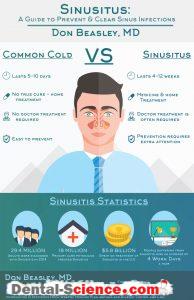
Sinus infection “sinusitis “ and cold have similar signs and symptoms and the challenge here is to differentiate between these cases to have the best treatment and medication.
“Sneezing, coughing, pain and pressure in forehead and behind the eyes “. They are common symptoms between cold and sinus infection. However, there are some differences between these conditions that can help you to determine your case.
The main difference between them is how long they linger, as in cold you will suffer from runny nose for 3 days then stuffy nose for 2 days then you will feel better, but in sinus infection it will take longer time and sometimes it may be accompanied with low grade fever.
The other sign is the color of the nasal discharge. In bacterial infection of sinus, bacteria can cause greenish or yellow mucus. But some viruses can produce greenish nasal discharge so it is not a remarkable sign.
what is a sinus infection?
Normally our skulls have many cavities that help to lighten their weight and these cavities are lined with thin mucosa, inflammation of these mucosa cause blockage of the sinus, facial pain and greenish mucus discharge and this what is called “sinus infection“.
Causes of sinus infection:
Any condition can cause blockage of the drainage of the sinus will lead to sinus infection as cold, allergy like “hay fever“, viral infection and may be from dental origin which is called “odontogenic sinusitis“ due to the short distance between teeth roots and sinus floor.
Types of sinus infection:
There are 2 types of sinus infection “Acute Infection and Chronic Infection“.
Acute type: is preceded by upper respiratory tract infection and usually caused by viral infection. The most causative agents are Streptococcus pneumonia, Haemophilus influenza, and Moraxella catarrhalis.
Viral sinusitis lasts for 1 to 10 days where bacterial sinusitis lasts for a longer time. Chemical irritation like smoking and fumes will trigger the condition.
Chronic type: represents a multifactorial infection, not a simple bacterial infection and lasts for about 3 months.
Diagnosis of sinus infection:
Acute type: we can distinguish bacterial sinusitis from viral sinusitis by watchful waiting as in case of viral sinusitis it will last for 10 days or less with decreasing of the severity of the symptoms but in case of bacterial infection it will last for more than 10 days with worsening of the symptoms.
Chronic type: it lasts for about 12 weeks and gives positive result with nasal endoscope test.
Endoscope Test involves inserting a flexible fiber-optic tube with a light and camera at its tip into the nose to examine the nasal passages and sinuses.
Treatment of sinus infection:
The target of treatment is enhancing the drainage of mucus from the sinus, thinning of mucus thickness and eliminate the cause. You can make a few steps in the home to help you feel better:
- Drinking enough amount of water.
- Applying warm packs on the face: it helps in relieving the pain and enhancing mucus drainage.
- Using over the counter “OTC“ decongestant nasal spray but it shouldn’t be taken for more than 1 week to prevent rebound sinusitis.
- Using pain killers as Paracetamol and Ibuprofen to relieve high temperature and pain.
- Regularly clean the inside of your nose with a salty water solution to help unblock your nose and reduce nasal discharge.
Antibiotics for sinus infection:
Antibiotics are only taken in case of bacterial infection. They are useless in allergic and viral sinus infections.
(Antibiotic shouldn’t be taken without a prescription)
For acute uncomplicated cases Amoxicillin is the most common antibiotic, it is effective and un-expensive. In case of patients with penicillin allergy Sulfur containing antibiotics are prescribed as: Trimethoprim and Sulfa methazole.
Antibiotics are specifically not recommended in those with the mild/moderate disease during the first week of infection due to the risk of adverse effects, antibiotic resistance, and cost.
For rebounded sinusitis and chronic sinus infection cases: bacteria are resistant to amoxicillin, so newer synthetic penicillin and cephalosporins such as amoxicillin/clavulanate (Augmentin), second-generation cephalosporins, and erythromycin-sulfasoxazole. Beta-lactamase–mediated resistance to the early second-generation cephalosporins is high among strains of Haemophilus influenzae and Moraxella catarrhalis.
Cefixime (a third-generation cephalosporin) may be selected for infections caused by H influenza or M catarrhalis, but it has a poor spectrum of activity against Streptococcus pneumonia.
The newer-generation macrolides, clarithromycin and azithromycin achieve excellent mucosal levels and should be considered in patients with penicillin allergies. Some recent studies suggest that macrolides may also have some anti-inflammatory effects. Clindamycin should be reserved for resistant S pneumonia.
Antibiotics can also be administered topically with or without a nebulizer. This mode of administration is used in patients who have had prior sinus surgery. The antimicrobials used are mupirocin, gentamicin, or tobramycin.
Sinus infection during pregnancy: pregnancy makes the case more complicated so immediate treatment is necessary to avoid complications. However, you can make home remedies as they mentioned before.
There are common antibiotics safe to be taken in pregnancy as amoxicillin and Amoxicillin –clavulanate.
Side effects of antibiotics:
All drugs have side effects however it doesn’t appear in all patients. Before taking any drugs you have to ask the pharmacist about the side effects.
You have to take the full course of the drug to prevent bacterial resistance. Keep in mind that the side effects of the antibiotic will disappear after taking the drug for a while. Usually, the benefits of the medicine are more important than any minor side effects.
If side effects still bother you and you wonder if you should keep taking the medicine, call your doctor. He or she may be able to lower your dose or change your medicine. Do not suddenly quit taking your medicine unless your doctor tells you to.

